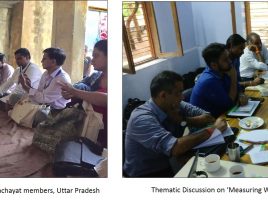Back to “Good Work”
Entrepreneurs – from village shopkeepers to owners of large industrial conglomerates – rule the economy. Economies have, in comparison to other influencing factors, an inordinately high impact on societal and environmental well-being. It follows, therefore, at the cost of oversimplifying something that is exceedingly complex, that any attempt to create positive outcomes for people and our planet needs to be based on a strategy that gets entrepreneurs to run green and inclusive businesses. We need to do this now, and in very large numbers to make good on the slim chance we have left of creating a sustainable future. The price of inaction has already become evident – widespread joblessness and a ravaged eco-system.
In a rapidly changing world, we need to understand, however, that the inherent complexity of the change we wish to effect on a large scale requires an equally complex, multi-faceted and systemic response that cannot be delivered by one organisation or a consortium of the “like-minded”. We must therefore, create and eventually mainstream innovative models of collaboration between sets of diverse stakeholders; working together across sectors and at different levels, to provide support services and an enabling environment to budding entrepreneurs.
Entrepreneurial attitudes and resourcefulness run deep in India – from the busiest streets of Mumbai to the remotest villages of poverty stricken regions in Uttar Pradesh and Bihar. People’s strengths and their initiatives are, however, stifled by a complex set of social and economic factors. Age-old constraints imposed by social norms and lack of access to support services prevent potential entrepreneurs from taking simple steps that would transform their lives. Their inability to do so, in turn, means that no new jobs are created, and the ecological footprint of goods and services produced through overly centralised systems of production and marketing continues to grow at an alarming rate.
There is a need to develop new, systemic approach to enterprise development; driven by social innovation, technology enabled connectivity and grassroots empowerment, particularly among women. Unlike “schemes”, this approach would rely on the creation of “platforms” that unleash entrepreneurship through co-creation of local business solutions within the community; empowering hundreds of thousands of entrepreneurs with tools to create their own futures and to provide livelihood security to millions of people, who are otherwise being left out of the Indian “growth story”.
Shortly before his death in 1977, E.F. Schumacher had foreseen, with rare insight and prescience, an alternative pathway to development that has become particularly relevant in today’s times. Captured in “Good Work”, he says, “Experience shows that whenever you can achieve smallness, simplicity, capital cheapness, and nonviolence, or indeed, any of these objectives, new possibilities are created for people, singly or collectively, to help themselves, and that the patterns that result from such technologies are more humane, more ecological, less dependent on fossil fuels, and closer to real human needs than the patterns (or lifestyles) created by technologies that go for giantism, complexity, capital intensity, and violence.”
It is time, perhaps, for humankind to get back to “Good Work”.
Shrashtant Patara
Senior Vice President, Development Alternatives
spatara@devalt.org
The views expressed in the article are those of the author’s and not necessarily those of Development Alternatives.






Leave a Reply